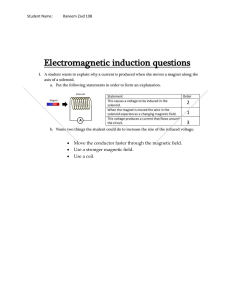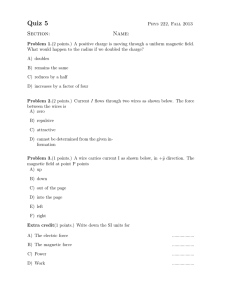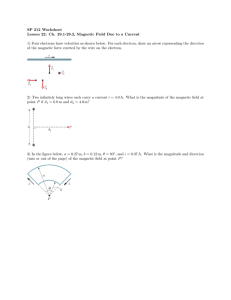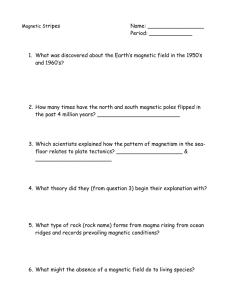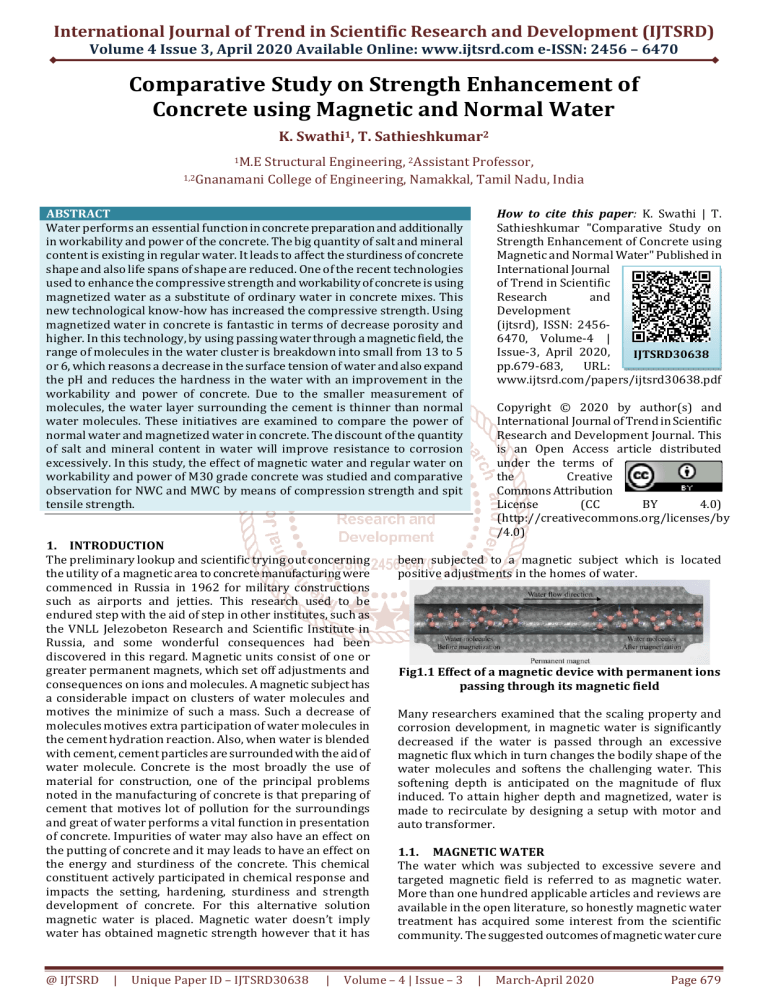
International Journal of Trend in Scientific Research and Development (IJTSRD)
Volume 4 Issue 3, April 2020 Available Online: www.ijtsrd.com e-ISSN: 2456 – 6470
Comparative Study on Strength Enhancement of
Concrete using Magnetic and Normal Water
K. Swathi1, T. Sathieshkumar2
1M.E
Structural Engineering, 2Assistant Professor,
1,2Gnanamani College of Engineering, Namakkal, Tamil Nadu, India
How to cite this paper: K. Swathi | T.
Sathieshkumar "Comparative Study on
Strength Enhancement of Concrete using
Magnetic and Normal Water" Published in
International Journal
of Trend in Scientific
Research
and
Development
(ijtsrd), ISSN: 24566470, Volume-4 |
Issue-3, April 2020,
IJTSRD30638
pp.679-683,
URL:
www.ijtsrd.com/papers/ijtsrd30638.pdf
ABSTRACT
Water performs an essential function in concrete preparation and additionally
in workability and power of the concrete. The big quantity of salt and mineral
content is existing in regular water. It leads to affect the sturdiness of concrete
shape and also life spans of shape are reduced. One of the recent technologies
used to enhance the compressive strength and workability of concrete is using
magnetized water as a substitute of ordinary water in concrete mixes. This
new technological know-how has increased the compressive strength. Using
magnetized water in concrete is fantastic in terms of decrease porosity and
higher. In this technology, by using passing water through a magnetic field, the
range of molecules in the water cluster is breakdown into small from 13 to 5
or 6, which reasons a decrease in the surface tension of water and also expand
the pH and reduces the hardness in the water with an improvement in the
workability and power of concrete. Due to the smaller measurement of
molecules, the water layer surrounding the cement is thinner than normal
water molecules. These initiatives are examined to compare the power of
normal water and magnetized water in concrete. The discount of the quantity
of salt and mineral content in water will improve resistance to corrosion
excessively. In this study, the effect of magnetic water and regular water on
workability and power of M30 grade concrete was studied and comparative
observation for NWC and MWC by means of compression strength and spit
tensile strength.
1. INTRODUCTION
The preliminary lookup and scientific trying out concerning
the utility of a magnetic area to concrete manufacturing were
commenced in Russia in 1962 for military constructions
such as airports and jetties. This research used to be
endured step with the aid of step in other institutes, such as
the VNLL Jelezobeton Research and Scientific Institute in
Russia, and some wonderful consequences had been
discovered in this regard. Magnetic units consist of one or
greater permanent magnets, which set off adjustments and
consequences on ions and molecules. A magnetic subject has
a considerable impact on clusters of water molecules and
motives the minimize of such a mass. Such a decrease of
molecules motives extra participation of water molecules in
the cement hydration reaction. Also, when water is blended
with cement, cement particles are surrounded with the aid of
water molecule. Concrete is the most broadly the use of
material for construction, one of the principal problems
noted in the manufacturing of concrete is that preparing of
cement that motives lot of pollution for the surroundings
and great of water performs a vital function in presentation
of concrete. Impurities of water may also have an effect on
the putting of concrete and it may leads to have an effect on
the energy and sturdiness of the concrete. This chemical
constituent actively participated in chemical response and
impacts the setting, hardening, sturdiness and strength
development of concrete. For this alternative solution
magnetic water is placed. Magnetic water doesn’t imply
water has obtained magnetic strength however that it has
@ IJTSRD
|
Unique Paper ID – IJTSRD30638
|
Copyright © 2020 by author(s) and
International Journal of Trend in Scientific
Research and Development Journal. This
is an Open Access article distributed
under the terms of
the
Creative
Commons Attribution
License
(CC
BY
4.0)
(http://creativecommons.org/licenses/by
/4.0)
been subjected to a magnetic subject which is located
positive adjustments in the homes of water.
Fig1.1 Effect of a magnetic device with permanent ions
passing through its magnetic field
Many researchers examined that the scaling property and
corrosion development, in magnetic water is significantly
decreased if the water is passed through an excessive
magnetic flux which in turn changes the bodily shape of the
water molecules and softens the challenging water. This
softening depth is anticipated on the magnitude of flux
induced. To attain higher depth and magnetized, water is
made to recirculate by designing a setup with motor and
auto transformer.
1.1. MAGNETIC WATER
The water which was subjected to excessive severe and
targeted magnetic field is referred to as magnetic water.
More than one hundred applicable articles and reviews are
available in the open literature, so honestly magnetic water
treatment has acquired some interest from the scientific
community. The suggested outcomes of magnetic water cure
Volume – 4 | Issue – 3
|
March-April 2020
Page 679
International Journal of Trend in Scientific Research and Development (IJTSRD) @ www.ijtsrd.com eISSN: 2456-6470
are diverse and often contradictory. The Australian Fluid
Energy mentions that the molecule organizations of
magnetic water fluctuate from molecule corporations of
ordinary water in having decrease diploma of consolidation,
and the molecules extent is greater uniform. Joshi et al
proposed magnetic discipline impact on hydrogen bonds
between water molecules and discovered some exchange
which came about in the homes of water such as mild
absorption, floor tension and pH. The activation of magnetic
area on water depends on the following three conditions
according to Huchler et al,
A. Magnetic flux density.
B. Duration of exposing water to magnetized field (velocity
of water current).
C. The quantity of exposing water to the subject.
1.2. EFFECT OF MAGNETIC WATER:
According to this literature study, a substance is stated to be
magnetized when its constituent molecules or structural
factors can be aligned in a definite direction via the have an
impact on of an exterior magnetic field. In a liquid or in a gas,
this can solely happen to molecules that possess an peculiar
range of electrons. Water, H two O, incorporates 10
electrons, so it is now not attracted to or oriented through a
magnet. In fact, water, like most molecules, is diamagnetic; it
is actually repelled via a magnet, even though so weakly that
touchy units are wished to observe this effect. Fig.1.2
suggests structural crew of water molecules. Water
molecules which consists of one oxygen molecule and two
hydrogen molecules bonded as an remoted triangle with its
upper perspective is 105º. When water is subjected to a
magnetic field, the water molecules will arrange in one route
This mode of association is caused by means of rest bonds,
then the bond angle decreases to much less than 105º, main
to a decrease in the consolidation diploma between water
molecules, and make bigger in measurement of molecules.
For these reasons, the viscosity of magnetic water is less
than viscosity of ordinary water. This change in water
molecules composite motives a trade in permeability
pressure, floor tension, pH and electric conduction.
a wire will make a magnetic subject surrounding the wire.
The desirable fields generated by moving electrons are used
in many domestic appliance, automobiles, and industrial
machines. One primary instance is that the magnet, which is
made from countless coils of wire wrapped around a central
iron core. The magnetic subject is present only whilst
electrical modern-day is handed thru the wire coils.
Permanent magnets don’t use an applied electrical current.
Instead, the magnetic area of a permanent magnet
consequences from the mutual position of the very small
magnetic fields mcreated by every of the atoms inside the
magnet. These atomic-level magnetic fields outcomes from
the spin and orbital actions of electrons. While several
resources endure alignment of the atomic-level fields in
response to an applied magnetic field, solely ferromagnetic
materials retain the atomic-level alignment when the applied
area is removed. As a result, all permanent magnets are
composed of ferromagnetic materials. Here these paper to
use PERMAG (N406) for manufacturing of magnetized water.
PERMAG is absolutely made up of strong rare earth magnets
referred to as atomic number 60 (N406). The magnetic
discipline intensity is 10,000 gauss energy and ten thousand
gauss power= 1 Tesla, therefore magnetic flux density of
PERMAG N406 is 1 Tesla.
Fig 2.1 Permag N406
2.2. CONCRETE INGREDIENTS
2.2.1. CEMENT
The cement used at some stage in this work used to be
Ordinary Portland cement of fifty three – 53 grade was used
as it comfy the necessities of IS and results have been Table
no 2.1
2.2.2. COARSE AGGREGATE
The coarse mixture of 20mm dimension used to be used in
the find out about the aggregates were examined as per IS
specifications. Locally available coarse combination (basalt
commonly known as blue metal) holding on 4.75mm sieve is
used. The bodily homes of coarse aggregate are listed
beneath in Table no 2.2
Fig 1.2 Structural group of water
2. MATERIALS COLLECTION
2.1. Permag N406:
Permag Neodimium 406 Magnetic fields are shaped via the
action of charged particles. For example, electrons flowing in
@ IJTSRD
|
Unique Paper ID – IJTSRD30638
|
S.
no
Physical properties
Values
As per
IS:8112-1989
1.
Specific gravity
3.15
3.10-3.15
2.
Standard consistency
28%
30-35
3.
Initial setting (min)
35
30 min
4.
Final setting (hr,min)
178
600 max
Table 2.1 Physical Properties Of Cement
Volume – 4 | Issue – 3
|
March-April 2020
Page 680
International Journal of Trend in Scientific Research and Development (IJTSRD) @ www.ijtsrd.com eISSN: 2456-6470
S. No
Physical Properties
Values
1.
Specific gravity
2.80
2.
Absorption
0.8%
3.
Nominal size of aggregate 12.5mm
Table 2.2 Physical properties of coarse aggregate
2.2.3. FINE AGGREGATE
M sand passing thru IS 4.75 mm sieve was once used as
quality aggregate. The sand used having Water absorption of
1% and unique gravity of 2.70. The sieve evaluation
consequences are proven in Table No. 2.3
S. No
Physical properties
Values
1.
Fineness modulus
3.24
2.
Specific gravity
2.70
3.
Size
4.75mm
4.
Water absorption ratio
1%
Table 2.3 Physical properties of fine aggregate
3. MIX DESIGN
In general, most of the building areas use M30 grade
concrete except including any admixture. So, right here M30
grade of concrete is used to extend the compressive power
the usage of magnetic water. The diagram of M30 concrete
has been carried out as per IS:10262-2009.
Fine
Coarse
aggregate aggregate
0.50
1
0.68
1.3
Table 3.1 Mix design for M30 grade
Water cement ratio
Cement
4. EXPERIMENTAL SETUP
In this technique the water is recirculated for one hour to
result in magnetic flux in the water through the motion of
utilized magnetic field. This recirculated water is used for
the casting of concrete specimens. The setup to gain the
above cited method consists of Autotransformer, 0.5HP
General reason Motor, Permag N406. The autotransformer is
used to decrease the furnish voltage of the motor, this
controls the waft of water in the setup. By this manner the
hardness in the water is reduced, this enhances the
resistance to corrosion of metal reinforcement.
recycled water and everyday faucet water, the outcomes are
proven under.
S. No Recirculation time pH value
1.
0
6.68
2.
10
6.90
3.
20
7.21
4.
30
7.40
5.
40
7.55
6.
50
7.67
7.
60
7.87
Table 4.1 Effect of pH value on recirculation time
4.2. HARDNESS
Hardness was once in the beginning described as the ability
of water to precipitate soap. Hard water types scale,
generally calcium carbonate, which reasons a range of
problems. . Left to dry on the floor of glassware, silverware,
and plumbing fixtures (shower doors, taps and sink tops),
challenging water leaves ugly scale, called water spots. Scale
that types on the internal of water pipes sooner or later
reduces the water pipes’ carrying capacity. Scale that types
within appliances, pumps, valves, and water meters causes
wear on shifting parts. The most commonly used gadgets
consist of grains per gallon (gpg), components per million
(ppm), and milligrams per liter (mg/L) The beneath desk
indicates variant of hardness (in mg/lit) with exchange in
recirculation time. As the recircuating time will increase
hardness decreases, which suggests that induction of
magnetic flux in water adjustments the property of hardness.
S.No Recirculation time Value
1.
0
530
2.
15
470
3.
30
430
4.
45
360
5.
60
325
Table 4.2 Effect of hardness on recirculation time
5. CASTING AND COMPARATIVE RESULT OF MAGNETIC
AND NORMAL WATER
5.1. COMPRESSIVE STRENGTH
Fig 4.1 magnetically treated and recirculation water
4.1. PH
In chemistry, pH is a scale used to specify how acidic or
primary a water-based solution. Acidic answer has a
decrease pH, whilst fundamental answer has a greater pH. At
room temperature (250C or 770F), pure water is neither
acidic nor simple and has a pH of 7. The pH check is carried
out for each and every fifteen minutes of recirculation. pH
take a look at is carried out for magnetically dealt with @ IJTSRD
|
Unique Paper ID – IJTSRD30638
|
Fig 5.1 Casting of cubes 150mm*150mm*150mm
Volume – 4 | Issue – 3
|
March-April 2020
Page 681
International Journal of Trend in Scientific Research and Development (IJTSRD) @ www.ijtsrd.com eISSN: 2456-6470
5.1.1.
Test result of cubes prepared using normal, nonrecirculation and recirculated magnetic water
Compressive Strength (N/mm2)
Quring
Sample
Sample
Sample
Days
Average
1
2
3
7 Days
21.3
22.3
22.5
22.03
28 Days
32.3
30.5
31.3
31.36
Table 5.1 Compressive Strength of Nmc
Quring
Days
Compressive Strength (N/mm2)
Sample
1
Sample
2
Sample
3
Average
7 Days
4.26
4.45
4.16
4.29
28 Days
5.35
5.80
6.00
5.70
Table 5.4 Split tensile strength of recirculation
magnetic water
Compressive Strength (N/mm2)
Sample
Sample
Sample
Average
1
2
3
7 Days
26.3
25.32
26
25.87
28 Days
41.65
40.55
40.32
40.84
Table 5.2 Compressive Strength Of Recirculation
Magnetic Water
Quring
Days
Graph5.2 Comparative strength of normal water and
recirculation magnetic water
Graph 5.1Comparative strength of normal water and
recirculation magnetic water
5.2.
SPLIT TENSILE STRENGTH
6. CONCLUSION
In this magnetic water science the power of concrete
receives make bigger barring including any admixture or
additives. As the recirculation time is accelerated the pH
price of magnetic water additionally will increase from 6.6 to
7.8 concurrently the hardness decreased from 530mg/lit to
325mg/lit. This will additionally provide higher answer for
corrosion of reinforcement in RCC buildings which appears
to be a large hassle in building industry latest days.
Compressive electricity of concrete at the cease of 28 days
for ordinary and recirculated magnetic water are 31.36
N/mm2 and 40.84 N/mm2. The common make bigger in the
compressive power is 36.1%. With in contrast to the regular
water the recirculated magnetic water concrete is greater in
compressive strength. In cut up tensile check the electricity
is higher in recirculated magnetic water compared to regular
water.
REFERENCE
[1] R. Nicole, “Title of paper with only first word
capitalized,” J. Name Stand. Abbrev. In press.
[2] Samkit D, Bafna, Nutan J and Pathak (Oct 2017),
“Experimental Inverstigation to enhance compressive
strength of concrete blended with plastic waste using
magnetized water”, International Journal of
Engineering and Technology, Volume 04, Issue 10.
Fig 5.2 Testing of Cylinder, size 150mm*300mm
5.2.1.
Test result of cylinder prepared using normal
and recirculated magnetic water
Compressive Strength (N/mm2)
Quring
Sample
Sample
Sample
Days
Average
1
2
3
7 Days
3.33
3.78
3.43
3.53
28
4.50
4.85
4.55
4.60
Days
Table 5.3 Split tensile strength of NMC
@ IJTSRD
|
Unique Paper ID – IJTSRD30638
|
[3] Siddharth P and Nutan J.P (January 2017),
“Experimental investigation of properties of concrete
cast in magnetic water”, International Journal of
Science Technology & Engineering, Vol. 07, pp:01-04.
[4] K. M., Joshi, and P. V. Kamat, (1966) “Effect of Magnetic
Field on the Physical Properties of Water” Pages (620622).
[5] K. J., Kronenberg, (1985) “Experimental Evidence for
Effects of Magnetic Fields on Moving Water” Pages
(2059-2061).
Volume – 4 | Issue – 3
|
March-April 2020
Page 682
International Journal of Trend in Scientific Research and Development (IJTSRD) @ www.ijtsrd.com eISSN: 2456-6470
[6] Nan Su; Wu Y.-H. and Mar C.-Y.,(2003) “Effect of
Magnetic Field Treated Water on Mortar and Concrete
Containing Fly Ash”, Cement and Concrete Composites,
Volume 25, Issue 7,Pages (681-688).
[7] P. S., Chechel, and G. V. Annenkova, (1972) “Influence of
Magnetic Treatment on Solubility of Calcium Sulphate”
Pages (60-61).
[8] S.O., Mirumyants, E. A. Vandyukov, and R. S.
Tukhvatullin, (1972) “The Effect of Constant Magnetic
Field on the Infrared Absorption Spectrum of Liquid
Water” PageS (124).
@ IJTSRD
|
Unique Paper ID – IJTSRD30638
|
[9] IS 456-2000, Indian Standard code for practice for
plain and reinforcement concrete, Bureau of Indian
Standards.
[10] O. T., Krylov, I. K. Vikulova, V. V. Eletskii, N. A. Rozno,
and V. I. Klassen, (1985) “Influence of Magnetic
Treatment on the Electro-Kinetic Potential of a
Suspension of CaCO3” Pages (820-824).
[11] Yes Yen Yes Associates, www.permagconditioner.com,
Volume – 4 | Issue – 3
|
March-April 2020
Page 683

